HEADLINES:
| |
 The 1st round of the Matched Small Grants Programme (MSGP) and Micro Environmental Grants (MEG) is launched under the UNDP/GEF “CASPECO” project The 1st round of the Matched Small Grants Programme (MSGP) and Micro Environmental Grants (MEG) is launched under the UNDP/GEF “CASPECO” project
The 1st round of the Matched Small Grants Programme (MSGP) and Micro Environmental Grants (MEG) is launched under the project “Caspian Sea: Depleted Fisheries and consolidation of a Permanent Regional Environmental Governance Framework”, short titled CASPECO. For details please follow the link: http://www.caspianenvironment.org/newsite/Grants-MSGP.htm. If you need any additional information, please contact PMCU.
|
| |
 A new electronic booklet “Matched Small Grants Program (MSGP) & Micro Environmental Grants (MEG)” has been produced A new electronic booklet “Matched Small Grants Program (MSGP) & Micro Environmental Grants (MEG)” has been produced
We are glad to inform you that a new electronic booklet “Matched Small Grants Program (MSGP) & Micro Environmental Grants (MEG)” has been produced. The booklet provides a brief on small-scale projects awarded with the MSGP & MEG under the CEP I-II. It also contains general information on CEP achievements and activities, grant procedures of the CASPECO project. It can be used as a guidance on standard typologies of small-scale projects on MSGP & MEG. To find it, please follow the link: http://www.caspianenvironment.org/newsite/Public-Promotional-Items-R.htm.
|
| |
 Updating Caspian Stakeholders Database (CSD) Updating Caspian Stakeholders Database (CSD)
The CSD is a main tool for networking with the Caspian Stakeholders, which includes nongovernmental organizations, community-based organizations, academic bodies, media, local authorities and likewise. It will help us to improve communication with and between the major stakeholders and create Partnerships in order to enhance and strengthen representation of the civil society in the context of the Tehran Convention implementation. To update the CSD we have developed a Registration Form and placed it on our website for ‘interested stakeholders’ to apply. We invite you to register yourself online. Please follow the link: http://www.caspianenvironment.org/newsite/registration.php and fill out the Registration Form. Your information will be electronically sent to and saved on the CSD.
|
| |
 A draft Strategy for Civil Society Engagement in the Caspian Sea Marine Environment is revised A draft Strategy for Civil Society Engagement in the Caspian Sea Marine Environment is revised
A revised draft Strategy for Civil Society Engagement in the Caspian Sea Marine Environment with the reflection of views expressed during the Caspian Stakeholders Meeting held in St-Petersburg on 13-17 May 2009 is placed on the CEP website: www.caspianenvironement.org for comments of interested stakeholders. We invite you to comment it. To find it, please follow the link: http://www.caspianenvironment.org/newsite/public-PublicParticipationStrategy.htm
|
| NEWS Archive: |
| |
 Press Release Press Release
|
| |
 Opportunity for nominating and promoting young students or colleagues as an FSC Darwin Scholar: Opportunity for nominating and promoting young students or colleagues as an FSC Darwin Scholar:
iAugust this year the FSC is launching a two week Darwin Scholar Programme that aims to develop“better naturalists” in the spirit of Darwin’s love of nature and observing the natural world. The Scholarship will focus on three areas
• skills of observation and identification
• skills of recording biodiversity
• skills of communicating biodiversity to different target groups
The full cost of the scholarship is 3000 GBP but the FSC is funding most of this ourselves. Scholars will have to find 750 GBP and the cost of the flight. This is fantastic value for a two week high level training course in the UK and I am sure that it should be possible to raise this money in your country through different funding sources for young scientists to attend. We can provide as much help as we can in terms of writing letters of support.
|
| |
 Caspian Tales Caspian Tales
The present book is a collection of stories, legends, poems and folkloric fictions about the Caspian Sea in the Republic of Azerbaijan, Islamic Republic of Iran and the Russian Federation. These tales are gathered by three Micro Environmental Grant Projects supported by CEP in the aforesaid countries. Sardarov Elchin, Esmaeil Nateghi Kajani and Nelly V. Terekhova are the grantees who have undertaken this endeavor in the Azerbaijan Coastal region, Iranian Caspian provinces and the Caspian region of Dagestan, respectively.
The Folkloric stories are the connecting bridge between the present and the past. These are often passed on to the next generations verbally with only few available in written. It is therefore important to preserve these in order to protect and preserve the cultural identity of ethnic groups and nationalities. The identification of Caspian folkloric stories is an endeavor for the protection of the Caspian cultural heritage.
Some of these stories are about the Caspian Sea, its environment and the interaction of local people with the Sea. Familiarization of children and the young generation with the Caspian stories would encourage them to think about the importance of Caspian Sea in their own lives and how they can protect this valuable body of water and its rich resources.
Last but not the least, the collection of these stories is a showcase a common heritage shared by all the people living near the Caspian Sea to create a link between the diverse cultures of this region.
Download the book
|
| |
 Kutum, Jewel of the Caspian Sea Kutum, Jewel of the Caspian Sea
The present book titled "Kutum, Jewel of the Caspian Sea" is a collection of research and studies conducted on this economically important fish of the Caspian Sea, especially as the result of the CEP sponsored MSGP project "Artificial Spawning of Rutilus Frisii Kutum of the Autumn Form", which was carried out by the Iranian Fisheries Research Organization during 2005–2007 period. This pilot project successfully released 2.5 Million fingerlings into the sea.
Although, the Kutum is only found in the Iranian Caspian coasts; it is the most popular fish with the highest economic value, besides the Sturgeon, in the South Caspian region. More than 12 thousand fishermen are engaged in the Kutum catch, which comprises more than 60% of the catch composition of bony fish species in the Iranian Caspian coasts. Unfortunately, due to the excessive economic and human activities in the region, the stocks of this valuable species are on the decline.
First, the present book introduces the biological, ecological and breeding characteristics of the Kutum. Then, investigates the causes of its stock decline and elaborates on the inappropriate methods of catch. Consequently, proposes the artificial breeding of Kutum backed by the newest scientific research as one of the most effective measures to replenish its resources and stabilize its population within the natural equilibrium of the South Caspian ecosystem.
Download the book
|
| |
 The Nippon Foundation of Japan Fellowship: The Nippon Foundation of Japan Fellowship:
The main objective of the Fellowship Programme is to provide advanced
education and training in the field of ocean affairs and the law of the
sea, and related disciplines including marine science, to government
officials and other mid-level professionals from developing States.
Thus, this programme provides a unique and fully funded opportunity for
qualified individuals working within the RSPs to undertake
research/studies in fields of direct relevance to RSPs.
Successful candidates will undertake their research/studies in two
back-to-back phases: the first, lasting six months, with a participating
academic host institution; and the second, lasting three months, with
the Division for Ocean Affairs and the Law of the Sea (DOALOS), UN
Office of Legal Affairs, or an appropriate participating host
institution.
The Fellowship Selection Committee is currently scheduled
to convene in early October 2007 to award ten fellowships for the
2008-2009 session, and successful candidates will be expected to begin
their placements early in 2008.
The fellowship application deadline is 15 August 2007, and candidates
should forward their applications directly to DOALOS. Additional
information, including the application package, detailed application
instructions, and a list of participating host institutions, is
available on the Fellowship web-site:
www.un.org/depts/los/nippon
|
| |
 First Meeting of the Conference of the Parties to the Framework Convention for the Protection of the Marine Environment of the Caspian Sea First Meeting of the Conference of the Parties to the Framework Convention for the Protection of the Marine Environment of the Caspian Sea |
| |
 New CEP GIS applications are available, including: New CEP GIS applications are available, including:
- Oil and Gas Objects Map
- Sediment Sampling Map 2005
- Flora and Fauna maps of the Caspian Region
|
| |
 European Joint Masters in Water and Coastal Management at the University of Plymouth 2007/8 European Joint Masters in Water and Coastal Management at the University of Plymouth 2007/8 |
| |
 First Conference on Environmental Management, Engineering, Planning and Economics (CEMEPE) will be held in Skiathos island, Greece, in June 24 to 28, 2007 First Conference on Environmental Management, Engineering, Planning and Economics (CEMEPE) will be held in Skiathos island, Greece, in June 24 to 28, 2007 |
| |
 Course on Regional Ocean Governance, 13 November to 15 December 2006 - Malta Course on Regional Ocean Governance, 13 November to 15 December 2006 - Malta
|
| |
 Tehran Convention will become enforceable on August 12th 2006 Tehran Convention will become enforceable on August 12th 2006
The Framework Convention for the Protection of the Marine Environment of the Caspian Sea, known as the Tehran Convention, will become enforceable next Saturday, August 12th 2006. According to Article 33 of Tehran Convention, “The Convention shall enter into force on the ninetieth day after the date of deposit of the instrument of ratification, acceptance, approval or accession by all Caspian littoral states”. Republic of Azerbaijan was the last littoral country to officially deposit its instrument of ratification. Since the Islamic Republic of Iran is entrusted with the functions of the Depository to the Convention, the Department of the Environment as the National Focal Point of the Convention in Iran will conduct a special ceremony to commemorate this event on August 12th in Tehran. Pertinent international, regional and national authorities will participate in the ceremony. The objective of Tehran Convention is the protection of the Caspian environment from all sources of pollution including the protection, preservation, restoration and sustainable and rational use of its living resources. Also, it provides the legal basis to enforce environmental regulations at the regional level for combating critical issues like drastic reduction in some marine living resources, pollution from land-based sources, invasive species and deterioration of habitats of rare and endangered species.
|
| |
 NATO Advanced Study Institute (ASI) On Overexploitation and Contamination of Shared Groundwater Resources NATO Advanced Study Institute (ASI) On Overexploitation and Contamination of Shared Groundwater Resources |
| |
 Grants Are Now Available Grants Are Now Available |
| |
 A U.N. panel has ordered a temporary halt to caviar exports A U.N. panel has ordered a temporary halt to caviar exports |
|
 “CEP Booklet is now available” “CEP Booklet is now available” |
| |
 Register for CEP NGO Database Register for CEP NGO Database |
| |
 Gilan Department of Environment : Algae Report Gilan Department of Environment : Algae Report |
| |
 EU-TACIS Sustainable Management of Caspian Fisheries Project (SMCFP) EU-TACIS Sustainable Management of Caspian Fisheries Project (SMCFP) |
| |
 NGO database is now available NGO database is now available |
| |
 CALL FOR EXPRESSIONS OF INTEREST (EOI) CALL FOR EXPRESSIONS OF INTEREST (EOI) |
| |
|

|
 With great sadness we share the news on the untimely death of Dr. Matkarim Radjapov, Minister of Nature Protection of Turkmenistan and the National Focal Point for the Caspian Environment Programme in that country. Dr Rajapov was a great man of knowledge, leadership, intelligence, commitment, care and understanding. His contribution to the effective management and protection of natural resources in Turkmenistan and in the Caspian Sea was exemplary. His outstanding partnership in the activities of the Caspian Environment Programme and in the process of the Caspian Framework Convention formulation and approval was most valuable and unique. His demise is a great loss to all of us. With great sadness we share the news on the untimely death of Dr. Matkarim Radjapov, Minister of Nature Protection of Turkmenistan and the National Focal Point for the Caspian Environment Programme in that country. Dr Rajapov was a great man of knowledge, leadership, intelligence, commitment, care and understanding. His contribution to the effective management and protection of natural resources in Turkmenistan and in the Caspian Sea was exemplary. His outstanding partnership in the activities of the Caspian Environment Programme and in the process of the Caspian Framework Convention formulation and approval was most valuable and unique. His demise is a great loss to all of us.
The CEP colleagues express their most sincere condolences to the his bereaving family, colleagues and friends. May God rest his soul in eternal Peace. |
|
| |
 First Meeting of Combined Interim Pollution Regional Advisory Group and Emergency Response Regional Advisory Group Opens in Tehran First Meeting of Combined Interim Pollution Regional Advisory Group and Emergency Response Regional Advisory Group Opens in Tehran |
Tehran , 13 October 2004 (United Nations Development Programme)- The first meeting of the Combined Interim Pollution Regional Advisory Group (PRAG) and the Emergency Response Regional Advisory Group (ERRAG) opened today in the Caspian Environment Programme office in Tehran .
The meeting's main objective is to discuss the chairmanship and hosting arrangements of the RAGs, preparing the strategic workplan for the groups, and providing advice on the implementation mechanism with a view to ensure a cost effective modality while enhancing regional involvement in the project activities. The meeting also aims to review the status of developments in the pollution monitoring, control and abatement and emergency response in the littoral countries as well as the ongoing related activities under the UNEP and EU supported initiatives.
Participants at this three-day meeting included the representative of the five coastal countries of Azerbaijan, Islamic Republic of Iran, Kazakhstan, Russian Federation and Turkmenistan as well as the representative of International Organizations of IAEA, UNEP, UNDP, WMC, Agip KCO, and Akwa Milgo.
The meeting was inaugurated by Mr. Mohammad Saeid Hossein Emami, Chairperson of the Steering Committee, and General Director of the Marine Environment Bureau of Department of Environment, Mr. Frederick Lyons, the UN Resident Coordinator and UNDP Resident Representative, and Dr. Hamidreza Ghaffarzadeh, CEP Project Manager.
For more information, please contact:
Dr. Hamidreza Ghaffarzadeh, CEP Project Manager, Programme Coordination Unit – CEP, Tel: (+98-21) 204 2285/204 2935/205 9577 Fax: (+98-21) 205 1850
To learn more about the Caspian Environment Programme, please visit: http://www.caspianenvironment.org
UNDP is the UN's global development network, advocating for change and connecting countries to knowledge, experience and resources to help people build a better life. We are on the ground in 166 countries, working with them on their own solutions to global and national development challenges. As they develop local capacity, they draw on the people of UNDP and our wide range of partners. For more information on UNDP: http://www.undp.org |
|
 Ratification of the Framework Convention for the Protection of the Marine Environment of the Caspian Sea ( Tehran Convention) Ratification of the Framework Convention for the Protection of the Marine Environment of the Caspian Sea ( Tehran Convention) |
On August 19, 2004 Tehran Convention was ratified by Mejlice of Turkmenistan (decree # 225-II). |
|
 CEP library goes online. CEP library goes online. |
With great pleas ure we would like to inform that after three months of hard work all the CEP technical documents are online and accessible to all.
More than 886 documents, mostly of technical nature are listed in our on-line library application. These can be searched and accessed by thematic category and cate gory as well as by title, country and language. The search procedure is an easy self- help process fully explained in the link
Visit our online library |
|
 NGO National Training meeting NGO National Training meeting
|
A NGO National Training meeting was held on 13 July 2004 at the PCU-Tehran with the participation of about 20 NGOs. The purpose of the meeting was to brief the NGOs on the objectives and planned activities of the CEP during its new phase in general and on the 4 th round of MSGP (MSGPII) in particular to explore possibilities of enhanced collaboration with the NGOs. Information regarding the Micro Environment Grants (MEG) was also included in the agenda of the meeting.
Presentations on CEP, GEFII, MSGPII and CEP in I.R. Iran were conducted by the Project Manager, MSGP team and SAPIC of the I.R. Iran during the meeting which was followed by questions and answers.
|
 |
Dr Arkadiusz Labon
1931-2004
It is with great regret that the Caspian Environment Programme notes the death of one of its most well respected collaborators, Dr Arkadiusz Labon, after a short illness. Dr Labon was known affectionately as Arek or Arkadi to all those associated with the initial phases of the Programme between 1995 and 2000.
Arek provided the main external support and technical advice to the programme on Caspian fisheries, helping to found a technical centre for fisheries based on the Caspian Scientific Fisheries Research Institute in Astrakhan , Russia . It was with the help of his personal drive and integrity that the programme managed to complete a thorough analysis of fisheries matters, a first full survey of the sea using new sonar techniques, and comprehensive proposals for putting fisheries management on a rational basis involving all 5 litteral countries. |
Arek brought to the Caspian a wealth of experience, including very practical experience of managing Polish fishing fleets, a wide range of technical experience, including as Director of Fisheries at the Food and Agriculture Organisation of the United Nations, and experience of the region. However, it was his personal characteristics and attributes that ensured the success of his work and that also drew so many people to regard him as a professional of the highest order and a friend and supporter.
Arek's involvement with the Caspian did not end with the ending of the European Union project under which he had worked. He continued to take a very active interest in Caspian fisheries, especially the sturgeon fisheries, thereafter. He regularly monitored events and was at the hub of a wide network of interested people, passing on news and providing comment and advice. Throughout, his only aim was the maintenance and improvement of Caspian fisheries and those who rely on the fisheries for their livelihood.
Arek was a special person, who through his honesty, integrity, openness, frankness and hard work showed all his colleagues how a professional should carry out his task. He is survived by a wife in Toronto , a son in San Francisco and grandchildren. They and all colleagues and friends will miss him badly. |
 Outstanding Release of 6000 Huso huso specimens into the south Caspian Sea Outstanding Release of 6000 Huso huso specimens into the south Caspian Sea
The first attempts to release about 6000 Huso huso specimens with an average weight of 1480 g were undertaken by The Fish Breeding & Rearing Dept. of the International Sturgeon Research Institute on 3 May 2004. These attempts that were made to address conservation of biodiversity & rehabilitation of sturgeon stocks in the Caspian Sea were the outcome of a joint project conducted by the International Sturgeon Research Institute on an agreement by the World Bank to award this institute a Grant in an amount of US $96,000.00 under the Matched Small Grant Program. The institute has put in US $ 98,000.00 as matching funds into this project.
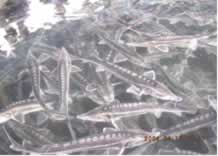 |
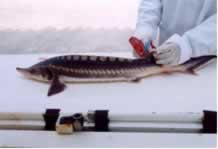 |
| Fig. 1 H. huso specimens ready for release |
Fig.2 Marking H. huso specimens with T-bar tags |
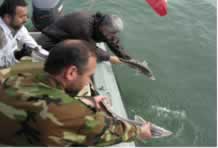 |
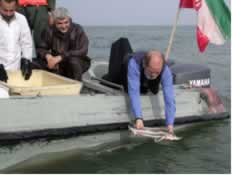 |
| Fig. 3 Releasing H. huso into the Caspian Sea |
Fig. 4 Releasing H. huso into the Caspian Sea |
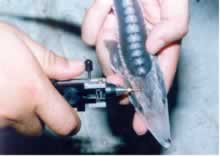 |
| Fig. 5 Marking H. huso specimens with CWT |
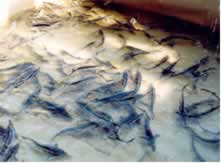 |
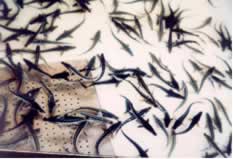 |
| Fig. 6 H. huso specimens in the first phase |
Fig. 7 Acipenser persicus specimens in first phase |
In the second phase of the project at the end of a 20 month rearing period 6000 H. huso specimens with an average weight of 1480 g were marked with T-bar tags and coded wire tags (CWT) were released into the south Caspian Sea in the Gilan Province in the presence of the Governor of the Gilan Province, Representative of The World Bank & Caspian Environment Program (CEP), Managing Director of the Gilan Fisheries, Director of Rehabilitation of Stocks, Managing Director of the Shilat Trading Company, Director of the Gilan Fisheries Research Center, Managers of Hatcheries and several fisheries research experts and newspaper reporters. Prior to this in September 2002 about 7000 sturgeon specimens that included 5000 H . huso (mean weight 15 g) and 2000 A. persicus (mean weight 8 g) were released into the Sepidrud estuary during the first phase of this project.
This was one of the effective measures taken towards the conservation of H. huso in the Caspian Sea . Although the I.R. of Iran releases 1-2 million H. huso fingerlings weighing 3-5 g into the Caspian Sea every year, none of the marginal Caspian States have so far attempted to release tagged specimens of this species in this weight class into the sea. We do hope that international organizations such as The World Bank and GEF continue support us to conduct joint research projects to protect and conserve H. huso as well as other sturgeon species in the Caspian Sea .
Mohammad Pourkazemi Ph.D
Director
International Sturgeon Research Institute
 Important Announcement: Extension of the Deadline for Submission of Abstracts to the 4th World Fisheries Congress to August 5, 2003. Important Announcement: Extension of the Deadline for Submission of Abstracts to the 4th World Fisheries Congress to August 5, 2003.
This is the final call for abstracts for the 4th World
Fisheries Congress (www.worldfisheries2004.org), to
be held in Vancouver, British Columbia, Canada from
May 2 - 6, 2004. The original deadline for submissions
(1 July 2003) has been extended to 5 August 2003.
The deadline for abstract submittal has been extended
to accommodate fisheries scientists in some areas
of the world that may have received information on
the Congress at a later date than others, as well
as to provide more time(as requested) for those seeking
permission to travel. There also may have been some
apprehension to travel associated with recent viral
concerns elsewhere in Canada, which is now dissipated.
Vancouver remains a safe destination for world travelers.
Thank you to the many hundreds of scientists who have
submitted their abstracts by the original deadline.
We are extremely pleased with your high level of
interest and the assurance of a well-attended and
successful congress, towards presentation of the finest
of fisheries science in the world. No further response
is needed from you at this time. You will be notified
at the end of September on the acceptance of your
abstract and its session assignment.
Please visit the event web site for further details
and to submit your abstract: www.worldfisheries2004.org/abstract/abstract.htm.
Posters will be the main communication medium of
the Congress and will be displayed prominently, with
a selection of oral presentations in concurrent sessions.
Oral and poster presentations will be given equal
status for subsequent publication in the proceedings.
Please note that new education and training workshops
have been added to the listing. These courses will
be available immediately before and after the Congress.
The workshops, to be presented by highly-qualified
instructors, will cover a range of practical and intellectual
challenges in fisheries management. More information
about the workshops is available at the event web
site: www.worldfisheries2004.org/education/education.htm.
We welcome your participation in the 4th World Fisheries
Congress and welcome you to Vancouver. If you have
not already done so, please visit our web site and
fill out an Expression of Interest Form that will
allow us to keep you updated on further developments.
Best Regards,
Bruce Ward
Dana Schmidt
Co-chairs, Fourth World Fisheries Congress
 The 5th Caspian
Environment Programme Steering Committee Meeting The 5th Caspian
Environment Programme Steering Committee Meeting
The Caspian Environment Programme (CEP) is governed by a
Steering Committee composed of representatives, typically at the Ministerial or
Deputy-Ministerial level, from each of the five Caspian littoral states. In addition, the
United Nations Environment Programme (UNEP), the World Bank (WB), The European
Union/Technical Assistance to the Commonwealth of Independent States (EU/Tacis), and the
United Nations Development Programme (UNDP) are members of the Steering Committee. The
Steering Committee is the Governing and Policy-Making body of the CEP.
The Steering Committee meets at least once a year in its
ordinary meetings, but may hold additional meetings at the request of the Steering
Committee Chairman. Representatives of the private sector, public and non-governmental
organizations are often invited to participate as observers.
The 5th Caspian Environment Programme Steering Committee
Meeting will be held in Ashgabat, Turkmenistan on 1-4th October 2002 hosted by
the Minister of Nature Protection of Turkmenistan and the current Chairman of the Caspian
Environment Programme, Mr Matkarim Rajapov.
The main objectives of the meeting are:
- To inform the Steering Committee members of progress in the four main CEP component
projects and affiliated projects.
- To inform the Steering Committee members of the outcome of the 7th Framework Convention
meeting and the proposed signing ceremony arrangement in Tehran.
- To agree amendments to the CEP Institutional Arrangements document and arrangements for
transfer of the Programme Coordination Unit from Baku to Tehran.
- Present the findings of the final Transboundary Diagnostic Analysis and draft National
Caspian Action Plans.
- To present initial International Partners proposals for support of Strategic Action
Programme implementation.
- To agree the final text of the Strategic Action Programme (including Biodiversity
Strategic Action Plan) and open the document for signing.
- To review and recommend project proposals for funding under the second round of the
Matched Small Grants Programme.
The “Conclusions and Recommendations” of the 5th Steering Committee Meeting will be published on our website at the beginning of November
2002.
For general information regarding the programme components please visit
our website: www.caspianenvironment.org
|
